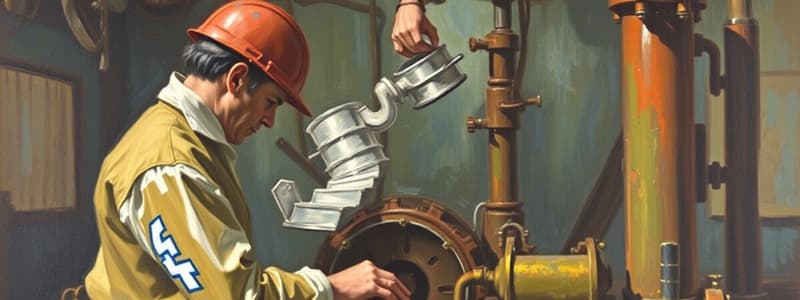Podcast
Questions and Answers
What is the primary objective of a company as outlined in mechanical maintenance?
What is the primary objective of a company as outlined in mechanical maintenance?
- Identify a market (correct)
- Make profit
- Provide useful commodity
- Satisfy a social need
Which of the following is NOT a consequence of lack of effective maintenance?
Which of the following is NOT a consequence of lack of effective maintenance?
- Frequent emergency maintenance work
- Inability to meet delivery dates
- Excessive machine breakdown
- Increased production output (correct)
What is included in the definition of maintenance?
What is included in the definition of maintenance?
- Only emergency repairs
- Training of maintenance staff
- Activities to restore or retain a facility's good condition (correct)
- Removal of outdated equipment
Which of the following is considered a primary function of maintenance engineering?
Which of the following is considered a primary function of maintenance engineering?
To achieve effective planning and scheduling in maintenance, what is essential?
To achieve effective planning and scheduling in maintenance, what is essential?
What is the primary goal of preventive maintenance?
What is the primary goal of preventive maintenance?
Which of the following is NOT an example of preventive maintenance?
Which of the following is NOT an example of preventive maintenance?
Who is qualified to perform preventive maintenance?
Who is qualified to perform preventive maintenance?
What is the main objective of predictive maintenance?
What is the main objective of predictive maintenance?
Which statement about preventive maintenance is true?
Which statement about preventive maintenance is true?
Flashcards are hidden until you start studying
Study Notes
Introduction to Maintenance
- Companies are typically motivated by objectives such as profit maximization, social responsibility, or providing essential goods.
- However, the primary focus should be on meeting market demand by effectively producing the right quantity, quality, and cost of goods.
- Efficient production requires optimized machinery and equipment operations, minimizing downtime to achieve the desired production volume.
Definition of Maintenance
- Maintenance encompasses any activity that restores or maintains a facility's functionality.
- It involves technical procedures ensuring machinery's continuous operation or restoring it to an acceptable state.
Need for Maintenance
- Efficient maintenance ensures the reliable availability of equipment and facilities.
- In a competitive environment, tight production schedules and high machine utilization are essential to maintain production levels.
Lack of Effective Maintenance
- Insufficient maintenance leads to consequences such as machine breakdowns, frequent emergency repairs, shortened equipment lifespans, and wasted maintenance resources.
- It can result in production delays, unmet delivery deadlines, excessive overtime, and potentially, safety hazards.
Functions of Maintenance Engineering
Primary Functions
- Maintaining existing machines and equipment.
- Maintaining existing buildings.
- Inspecting and lubricating machinery and equipment.
- Generating and distributing utilities like water and electricity.
- Installing new equipment.
- Modifying existing machines, equipment, and buildings.
Secondary Functions
- Sanitation.
- Disposal of used items.
- Storekeeping.
- Fire protection.
- Janitorial services.
Definition of Preventive Maintenance (PM)
- PM is a scheduled maintenance plan aimed at preventing breakdowns and failures.
- Its central goal is to preserve and enhance equipment reliability.
Examples of PM
- Regular oil changes, greasing, filter replacements, belt tightening, and any activities prolonging equipment life and improving efficiency.
Preventive Maintenance Quiz
- PM is necessary for all equipment, not just large machines.
- Manufacturers usually provide PM guidelines in their manuals.
- PM procedures should be based on manufacturer recommendations, considering factors such as oil type, quantity, timing, and visual inspections.
Benefits of PM
- Increases equipment lifespan.
- Reduces failures and breakdowns.
- Minimizes costly downtime.
- Decreases the cost of replacements.
Who Performs PM?
- Only trained and qualified maintenance personnel should perform PM.
Why PM Training is Essential
- Ensure proper techniques and procedures are followed.
- Avoid issues like over-greasing or improper tightening, which can shorten equipment life.
- Proper lubrication is crucial for extending equipment lifespan.
Predictive Maintenance (PdM)
- PdM utilizes techniques that assess the condition of in-service equipment to predict when maintenance is necessary.
- The primary objective of PdM is to minimize operational disruptions while enabling budget-planned repairs.
Examples of Predictive Maintenance
- Techniques used for PdM include vibration analysis, infrared thermography, oil analysis, and visual inspections.
Predictive Maintenance Quiz
- Predictive maintenance identifies trends and provides valuable historical data.
Studying That Suits You
Use AI to generate personalized quizzes and flashcards to suit your learning preferences.




